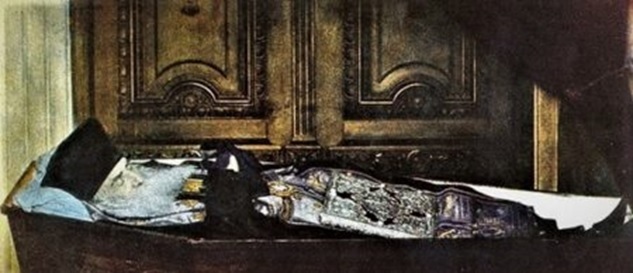How the relics of Saint Nektarios brought a woman of loose morals to repentance
9 November 2022On 2 September, 1953, the relics of Saint Nektarios of Pentapolis were disentombed in the Monastery of the Holy Trinity which he had founded and built on the island of Aegina. The next day a festal liturgy was celebrated, at the end of which the relics were carried in procession. While this was happening, the relics exuded a most powerful fragrance which affected everyone in the monastery, as well as the residents of the surrounding area.
At that time, the local bus was making its way up and when it reached the Holy Apostles bridge, one of the passengers, a woman of loose morals, became aware of the strong fragrance of the relics, as she herself told us later.

The other passengers were aware of the fragrance as well, but it accompanied the woman as far as Saint Marina’s where she had an illicit assignment.
When she arrived at her destination, she was overcome by some inner force and, instead of going on to her rendezvous, she got back on the same bus and made the return journey, alighting at the stop for our monastery.
She took off her shoes and made her way up the incline leading to the monastery. She came into the church where the holy skull of Saint Nektarios had been placed and she began kissing it fervently, sobbing and repenting. She was still aware of the same fragrance that had followed her from the bridge of the Holy Apostles to Saint Marina.
She was so moved by the inner change that she’d experienced- certainly at the instigation of Saint Nektarios- that she spontaneously removed the gold necklace she was wearing and, out of gratitude, placed it on the disc on which the skull of the saint lay, as an offering.
After that, she turned to the Abbess and to the assembled clergy and prominent citizens and boldly confessed that, until then she’d led a debauched life. After experiencing this inner change, she now wanted to be forgiven and asked for a priest to confess to.
This lady gave an icon of Saint Nektarios to the chapel of Saint Nicholas on the pier at Aegina, where a divine liturgy is celebrated every year on the anniversary of the demise of Saint Nektarios.
From the information the monastery has concerning her, it appears that from the day when these events took place, this lady abandoned her debauched life-style and thereafter lived modestly. This was the result of the powerful internal change worked within her by the influence of Saint Nektarios.






